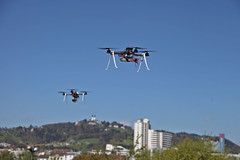| Drones (Photo credit: Ars Electronica) |
Whenever I have a group of Guam students looking at the island in Google Earth, they are always surprised that they are able to get a bird's-eye view of the local Air Force base. The ability to see rows of F-18s parked on the tarmac doesn't seem right to them because in reality they don't have access to the base. Some question whether Google is giving assistance to enemies by providing these views. From Street View's privacy issues to objections from foreign governments, questions such as these illustrate how advances in technology can sometimes move faster than what public discourse is ready for.
I think most people would be surprised to learn that the number of drone attacks increased significantly when Barack Obama became President. Less than 50 strikes were reported in 2008 compared to over 120 in 2010. (This will undoubtably be a topic raised during John Brennan's upcoming CIA Chief confirmation hearing since Brennan is credited as leading the drone program in recent years.) The argument for military drone aircraft is that they don't require a pilot in the traditional sense. They are controlled by persons hundreds of miles, or perhaps continents, away. This puts American pilots out of harm's way and makes pilot fatigue a non-issue. I'm sure military drone aircraft are also less expensive to manufacture and maintain than traditional fighter jets. The drones may also be more accurate in their targeting, which leads me to arguments against. A number of strikes in the Middle East have resulted in large numbers of civillian casualties. If the drones are expendable, does that encourage an even greater use of them? I think the fact that drones are un-manned aircraft gives most people pause. How do you feel about sending robots out to kill other humans? This seems to be a question out of science fiction, but it is the reality of today and a question I think we should pose to students.
What are the acceptable limits of drone use? I don't mean to present myself as a drone opponent. I think there is incredible potential in their use (as you can see in the video below) but I think the drone discussion should begin now. It will be an issue today's youth will face in their daily lives and as the drone industry grows they may find themselves a part of it. So what do you think? Should drones be used to patrol our borders? Should police departments have them? How do you feel about a squadron of drones enforcing our nation's speed limits? What does "pilot-error" mean in regards to drones? How do you feel about advertisers using drones? What does drone airspace mean? How big can a drone be? How small? Can a drone block your view of something? Can a drone play audio? How loud? Would you accept homework from a student's drone? How would you prove drone crimes? Should we keep drone technology - the good and the bad - away from other countries? What would a terrorist do with a drone? What would a drone war look like?
I would love to do a post devoted to the positive use of drones. They come in all sorts of shapes and sizes, and show great promise in aid to the environment, medicine, and safety. Call me paranoid, but right now, I'm thinking about the drone hazards we may face tomorrow.
Tweet



